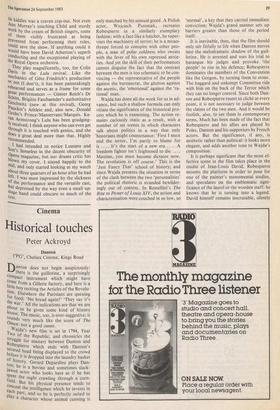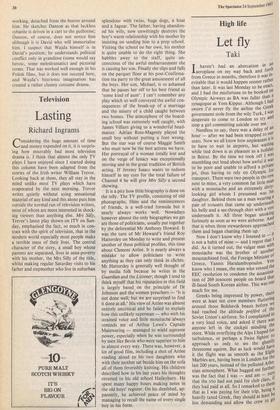Cinema
Historical touches
Peter Ackroyd
Danton CPC', Chelsea Cinema, Kings Road
Danion does not begin auspiciously: there is the guillotine, a surprisingly compact instrument which might have come from a Gillette factory, and here is a little boy reciting the Articles of the Revolu- tion. Elsewhere the Parisians are queuing for food: 'No bread againl"They say it's the War.' All the indications are that we are about to be given some kind of history lesson. The music, too, is over-suggestive; it sounds very much like the score of The Omen: not a good omen. Wajda's new film is set in 1794, Year Two of the Republic, and chronicles the struggle for mastery between Danton and Robespierre which ends with Danton's severed head being displayed to the crowd before it is dropped into the laundry basket of history. Gerard Depardieu plays Dan- !cm; he is a bovine and sometimes slack- Jawed actor who looks here as if he has spent the night crawling through a corn- field. But his physical presence tends to
conceal the intelligence which he invests in each , Part, and so he is perfectly suited to Play a character whose animal cunning is only matched by his sensual greed. A Polish actor, Wojciech Pszoniak, recreates Robespierre in a similarly exemplary fashion: with a face like a hatchet, he super- vises the machinery of terror; he is a misan- thrope forced to conspire with other peo- ple, a man of polar coldness who sweats with the fever of his own repressed anxie- ties. And yet the skill of their performances cannot disguise the fact that the contrast between the men is too schematic to be con- vincing — the representative of the people against the bureaucrat, the glutton against the ascetic, the 'emotional' against the 'ra- tional' man.
Wajda has done all the work for us in ad- vance, but such a shallow formula can only vitiate the significance of the historical pro- cess which he is examining. The action re- mains curiously static as a result, with a number of set scenes in which characters talk about politics in a way that only 'historians might countenance: 'First I must end the terror, I'm partly to blame for it .... It's the start of a new era . „ A freedom fighter isn't frightened to die .... Maximo, you must become dictator now. The revolution is off course.' This is the 'Just Fancy That' school of history; and since Wajda presents the situation in terms of the clash between the two 'personalities' the political rhetoric is stranded bewilder- ingly out of context. In Rossellini's The Rise to Power of Louis XIV, the action and characterisation were couched in so low, so
'normal', a key that they carried immediate conviction; Wajda's grand manner sets up barriers greater than those of the period itself.
It is inevitable, then, that the film should only stir fitfully to life when Danton moves into the melodramatic shadow of the guil- lotine. He is arrested and uses his trial to harangue his judges and provoke 'the people' to rise in his defence; Robespierre dominates the members of the Convention like the Gorgon, by turning them to stone. The haggard and unkempt Committee ride with Min on the back of the Terror which they can no longer control. Since both Dan- ton and Robespierre resort to cliché at every point, it is not necessary to judge between the claim's of the two men. And it would be foolish, also, to see them in contemporary terms. Much has been made of the fact that Robespierre and his allies are played by Poles, Danton and his supporters by French actors. But the significance, if any, is aesthetic rather than political: it looks more elegant, and adds another tone to Wajda's composition.
It is perhaps significant that the most ef- fective scene in the film takes place in the studio of Jean-Louis David, Robespierre mounts the platform in order to pose for one of the painter's monumental studies, and speculates on the emblematic signi- ficance of the laurel or the wooden staff: he knows that he is turning into a legend. David himself remains inscrutable, silently
working, detached from the horror around him. He sketches Danton as that luckless sybarite is driven in a cart to the guillotine; Danton, of course, does not notice him although it is David who will immortalise him. I suspect that Wajda himself is in David's position; he understands political conflict only in grandiose (some would say heroic, some melodramatic) and pictorial terms. That has worked well enough in his Polish films, but it does not succeed here, and Wajda's histrionic imagination has created a rather clumsy costume drama.







































 Previous page
Previous page